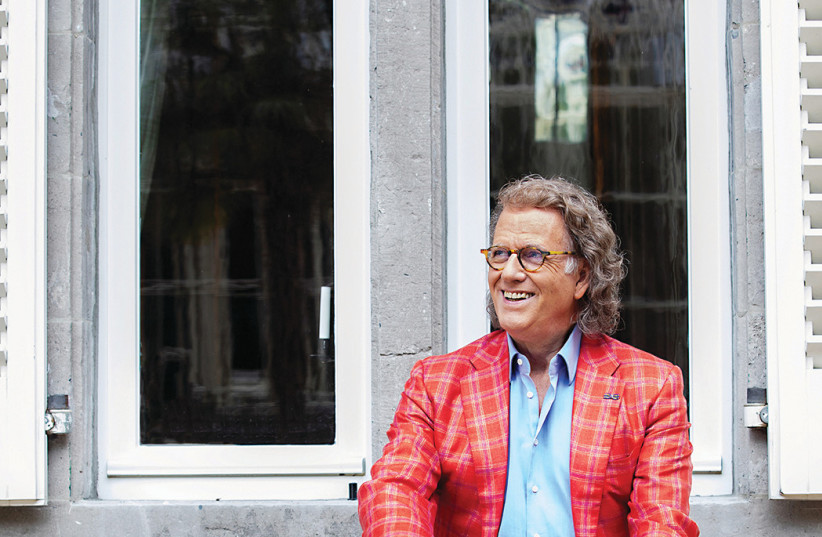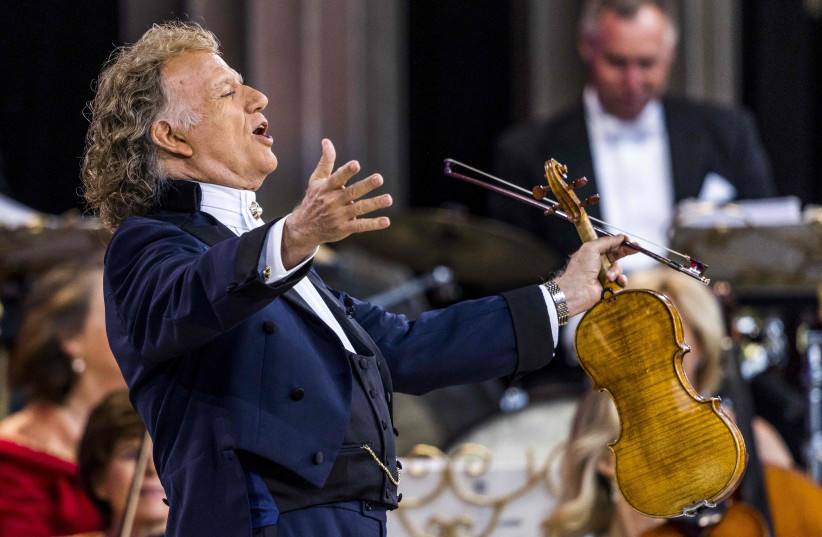André Rieu is considered one of the most successful violinists in the world. A conductor who puts on splendid performances, he is also a revolutionary leader in the world of classical music. His albums have sold more copies than famous pop stars such as Madonna. He arrived in Israel this past week to perform at the Menora Mivtachim Arena in Tel Aviv.
“During this tour, we will be playing all over the world, and one of our stops is Israel,” Rieu explains.
“Our previous trip to Israel was spectacular, and we expect nothing less from the current visit.
André Rieu
“Most of the time when people go to classical music concerts, they know ahead of time who the conductor is, what type of music they will play, and who the musicians are. In this case, no one in the audience knows ahead of time which pieces we will be performing. Many people have seen videos of my concerts on YouTube, and so what they do know for sure is that it will be an experience they will never forget.”
Rieu, 73, performed at the Menora Mivtachim Arena in 2018 and was slated to perform here again a few years ago, but his tour was canceled due to COVID. For this performance, Rieu will be performing with his Johann Strauss Orchestra, the Symphony Choir and soloist performers.

His repertoire includes orchestral adaptations of successful pop songs, such as “Macarena,” “Mambo No. 5” and “Hallelujah.”
Rieu was ensconced in the world of classical music from the moment he was born. His father was the renowned conductor of the symphony orchestra in Limburg, in the Netherlands, and he succeeded in passing down his love of music to his six children, of which Rieu is the third oldest.
He began playing the violin at age five and developed a love for the symphony when he was quite young. Later, he began his studies at the Royal Conservatoire of Liege, continued on to the Conservatorium Maastricht, and then studied under the tutelage of famed Dutch violinist Herman Krebbers.
How do you choose which pop songs to turn into orchestral versions?
A lot of the time it is my wife who comes up with the idea to play around with certain songs, to see if we can make something interesting out of it. And she’s usually right. It’s always fun to sit down and brainstorm with the members of my music ensemble in my studio in the Netherlands. I put an idea on the table, and then we all think out loud about how we might arrange a new work of music. The way we collaborate on new creations is quite an exciting process.
You’ve achieved so many goals in your career. What is next on your list?
To continue what I’m doing now. I’m still in good health and have only lived the first half of my life so far [he says jokingly]. My dream is to continue performing around the world and bringing joy and excitement to our audiences.
I think it’s pretty awesome that at age 73 I am still performing all over the globe. I’m living my dream every single day. I exercise every day, I eat healthily and don’t drink alcohol, and so I think I’m doing everything I can to make it possible to be able to continue this lifestyle.

What kind of music do you listen to at home?
I don’t. My father was a conductor. I am familiar with every genre of music, and my work involves music. And so when I’m home, I like to cook, sleep and relax. I never listen to music. My wife is the one who listens to music at home. For me, listening to music is not relaxing. For me, the most beautiful music is the absence of sound.
How did you become interested in classical music at such a young age?
In my family, we heard only classical music at home. We were not allowed to listen to any other musical genre. It was kind of like living in a monastery – we weren’t given much freedom or choice.
From the time I was very young, I felt that classical music was heavy and too restrictive. I loved listening to all different types of music, and so I was very excited to begin learning at the conservatory, which is where I first began creating my own compositions.
Did you grow up thinking you’d be a composer or conductor?
No, definitely not. My first dream was to be a violinist. Only later in life did I begin engaging in composition, conducting and music arrangement. Anyone who has seen me perform up on the stage knows that I’m also a bit of an entertainer – I like to speak to the audience in between segments. But I only began doing that recently. I began my studies with musical theory, which I’m grateful for, since this is the best foundation for a musician. I was born on a Sunday, and therefore I have an extremely positive outlook on life. I love that humor plays such a big role in my life.
Are there any contemporary musicians with whom you’d be interested in collaborating?
For me, any quality work of music is true music – regardless of whether it’s pop, rap or any other form of music. Any music that makes you feel something deep inside your heart is good music.
When you listen to my repertoire, you’ll notice that I bring together a large variety of styles. I love Bruce Springsteen, who happens to be the same age as me. He is also still full of energy. Who knows – maybe one day we’ll collaborate on a project together.
Which career moments are you most proud of?
I am most proud of the day each of my children was born, and the day I met my wife. None of these days is connected to my career, though. I can’t really think of any moment in my career that I’m particularly proud of.
I’m a bit self-critical; I always see the places where I could have done better. The halls where my recent performances in South America took place were filled to bursting, and I believe most of the people in the audience left at the end with a smile on their faces. Of that I am proud.
What do you think the secret to your success is?
My wife’s father, who was Jewish, escaped from Berlin in the 1930s. He was able to take with him only one suitcase, which he filled with records of classical music that had been recorded in Berlin. This has had a strong effect on my wife, and also on my own personality. It’s what made me the person I am.
It’s hard to pinpoint what exactly it is about my music that makes it so successful. What’s important to me is that when I get up on the stage, the people in the audience understand that my music is real and that I am opening up my soul to them. They can tell that I’m not pretending, that the person they see on the stage is the real me, not some act. When I’m excited about something, you can see it; and when I’m having a hard time, or I’m happy, you can see that, too. This is something that is very important to me.
How did the documentary about your life come about?
Many years ago, a Dutch filmmaker asked me if I would agree to let his team follow me around. At first I refused, since I wanted my private life to remain private; but after a while I came around and agreed to offer them a close up look of my life.
Until Welcome to My World was aired in 2013, people only knew me from my performances. They didn’t truly know anything personal about me. People who watched the documentary commented, saying ‘Wow, he really is a nice person.’ We participate in a show for British TV every year, and apparently viewers really love watching it.
What kind of feedback have you heard about your music?
People write such amazing comments, like ‘André, you saved my life. I had such a difficult year, and you saved me.’ I’ve also had lots of parents write me and tell me that their toddlers love my music. Older people tell me that they love my music and listen to their DVDs all day long. It’s amazing how many people have written to me.
There has also been criticism about your music. Some journalists and music critics claim that your music is sensationalist pop music with no connection to the world of classical music. How do you respond to that?
I don’t think any of the people who say that have actually been to one of my concerts. I say, first of all, attend one of my concerts, and then see if you haven’t fallen in love with my music.
There are plenty of leading classical musicians who love my music and my work. But, of course, everyone is welcome to have their own opinion, and music is very personal. Fortunately, we live in a world in which we are free to express our views, and it’s wonderful that everyone has their own individual opinion.
I do not get insulted when people criticize my music. I had a traditional musical education, and I’ve developed my own style. That’s just how I am. I love the compositions I create, and there are millions of people who love them, too. Sometimes people can recognize one of my works after hearing just the first three notes, and I take that as a huge compliment.
Did anyone pressure you not to perform here in Israel?
Yes, this time, as well as the previous time I came to perform in Israel. But if I want to come to Israel, then I’m going to come to Israel and put on a show. I come to Israel to perform in front of people, to entertain and make them happy.
I’m not a political person; I’m a musician. I wouldn’t travel to North Korea or Saudi Arabia, for example. But I’m more than happy to come to Israel – Israel is a normal country.
What was it like for you during the COVID lockdowns?
It was an incredibly difficult time. I spent my time baking cookies and learning Spanish, and somehow I managed to survive. Thankfully, the government in the Netherlands offered official businesses grants, and we were lucky to receive enough funds to keep the orchestra alive. Otherwise, there would have been no way for me to keep 100 people on our payroll.
It’s quite an expensive affair to run a symphony orchestra. I feel responsible for the welfare of all my employees. Building up our incredibly talented team of musicians is something that has taken us years and years. Our most veteran member has been with us for 35 years.
Translated by Hannah Hochner.
